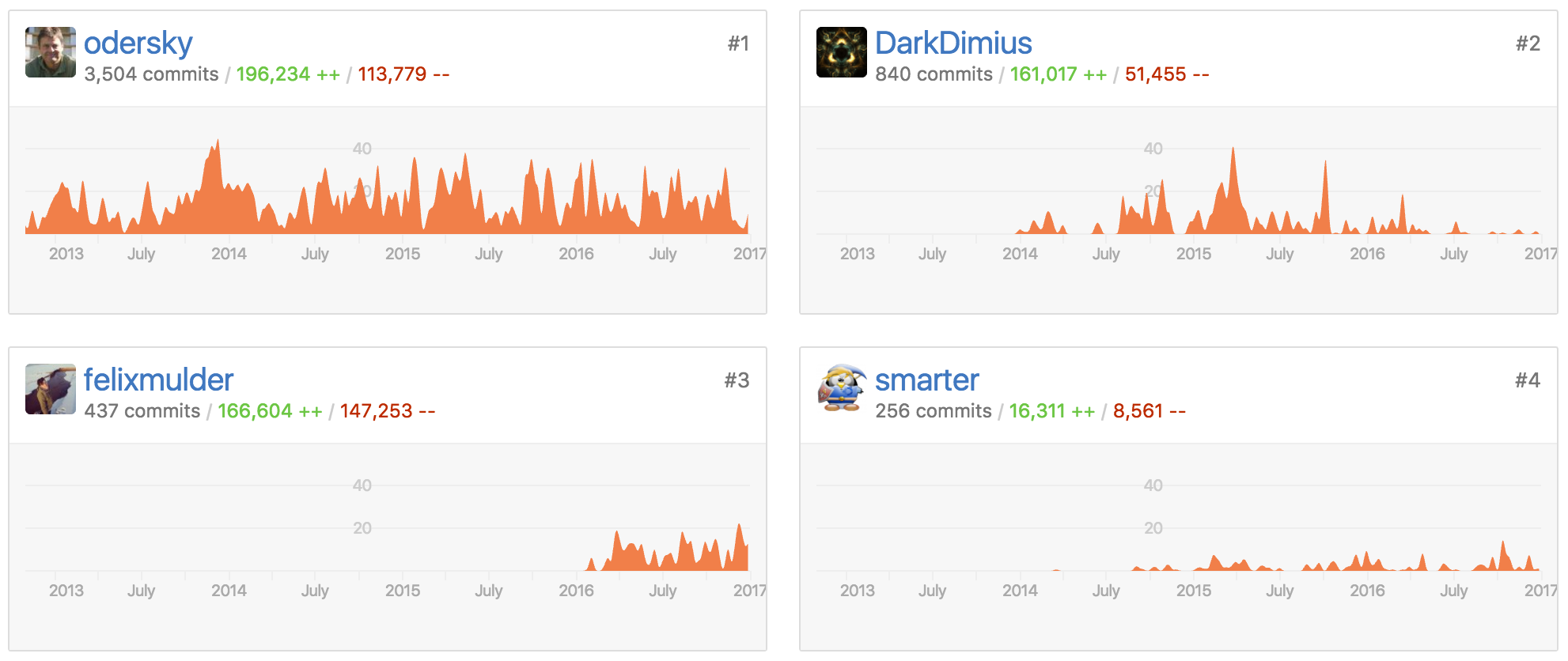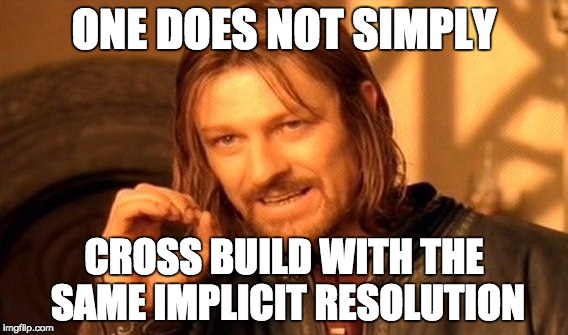@felixmulder
DECONSTRUCTING DOTTY
A NEXT GENERATION SCALA COMPILER
Felix Mulder
RECONSTRUCTING SCALA
DOTTY: THE TIME TRAVELLING SUPER COMPILER
Felix Mulder
THOUGHTS ON SCALA 3
HOW DOTTY SHOULD RESHAPE DEV EXPERIENCE
Felix Mulder
ABOUT ME
- @felixmulder
- github.com/felixmulder
- Built the 2.12 Scaladoc
- Research fellow LAMP EPFL
- Dotty Compiler Engineer
 </bragging>
</bragging>
Who in here knows Scala?
Who uses it professionally?
ALL (GOOD) STORIES HAVE A BEGINNING


- Beautiful syntax
- Less boilerplate
- FP without the FUD
- but then again…

<SURPRISES>
trait Super {
def x: String
println(s"initialized with: $x")
}
class Tester extends Super {
val x = "wat"
}"initializd with: null"DON’T WORRY SCALA, I STILL LOVE YOU
WE CAN WORK AROUND THIS
Newbie “Solutions”
- Compromised Immutability
- Lazification hell
- Refactor, maybe dump the trait

public interface Super {
default public void $init$() {
println("initialized with: " + x());
}
public String x();
}
public class Tester implements Super {
private final String x;
public Tester() {
Super.super.$init$();
x = "wat";
}
public String x() { return this.x; }
}TYPE INFERENCE
TYPE INFERENCE
def merp[A,B](a: A, f: A => B): B = f(a)
merp(1, x => x * 2) // error: missing parameter typeTYPE INFERENCE
def merp[A,B](a: A)(f: A => B): B = f(a)
merp(1)(x => x * 2) // 2trait ListOf[+A] {
def foldLeft1[B](z: B, f: (B, A) => B) = ???
foldLeft1(List.empty, (b, a) => b) // 1
foldLeft1(List.empty, (b, a) => a :: b) // 2
def foldLeft2[B](z: B)(f: (B, A) => B) = ???
foldLeft2(List.empty) { (b, a) => b } // 3
foldLeft2(List.empty) { (b, a) => a :: b } // 4
}trait ListOf[+A] {
def foldLeft1[B](z: B, f: (B, A) => B) = ???
foldLeft1(List.empty, (b, a) => b) // 1
foldLeft1(List.empty, (b, a) => a :: b) // 2
def foldLeft2[B](z: B)(f: (B, A) => B) = ???
foldLeft2(List.empty) { (b, a) => b } // 3
foldLeft2(List.empty) { (b, a) => a :: b } // 4
}trait ListOf[+A] {
def foldLeft1[B](z: B, f: (B, A) => B) = ???
foldLeft1(List.empty, (b, a) => b) // 1
foldLeft1(List.empty, (b, a) => a :: b) // 2
def foldLeft2[B](z: B)(f: (B, A) => B) = ???
foldLeft2(List.empty) { (b, a) => b } // 3
foldLeft2(List.empty) { (b, a) => a :: b } // 4
}trait ListOf[+A] {
def foldLeft1[B](z: B, f: (B, A) => B) = ???
foldLeft1(List.empty, (b, a) => b) // 1
foldLeft1(List.empty, (b, a) => a :: b) // 2
def foldLeft2[B](z: B)(f: (B, A) => B) = ???
foldLeft2(List.empty) { (b, a) => b } // 3
foldLeft2(List.empty) { (b, a) => a :: b } // 4
}INSTANTIATE AS LATE AS POSSIBLE
BUT NOT TOO LATE
trait ListOf[+A] {
def foldLeft1[B](z: B, f: (B, A) => B) = ???
foldLeft1(List.empty, (b, a) => b) // 1
foldLeft1(List.empty, (b, a) => a :: b) // 2
def foldLeft2[B](z: B)(f: (B, A) => B) = ???
foldLeft2(List.empty) { (b, a) => b } // 3
foldLeft2(List.empty) { (b, a) => a :: b } // 4
}</SURPRISES>
SLOW COMPILE TIMES
Scala provides:
- higher-order types
- generic methods
- generic classes
- multiple inheritance
- pattern matching
- lazy evaluation
- garbage collection
Compilers crash course
- Tokenize Source
- Build Trees (AST)
- Typecheck
- Simplify
- Bytecode!
1 + 2 (+)
/ \
(1) (2)Apply(Select(Lit(1), $plus), List(Lit(2)))
Phase 1
Phase 2
Phase 3
javac pipeline
- Parse
- Enter
- Annotate
- Attribue
- Flow
- Desugar
- Generate
dotty pipeline
source codeBut, but, but compilation speed?
You said Dotty would be faster!Fused Phases
Phase 1
Phase 2
Phase 3
LANGUAGE IMPROVEMENTS
- Trait Parameters
- No more procedure syntax
- No old style macros, embrace the meta!
- Union Types
- Intersection Types
- Implicit functions
Procedure Syntax
def foo {}
// error!
def foo = {}
// res: Unit-language:Scala2
Intersection and Union Types
A & B
the greatest lower bound: a supertype of all subtypes of both A and B
A | B
the least upper bound: a subtype of all supertypes of both A and B
trait A
trait B
trait C extends B with A // ==> A & B is a supertype of Cclass A(val i: Int)
class B(val i: Int)
def p1(implicit ev: A <:< (A | B)) = ???
def p2(implicit ev: B <:< (A | B)) = ???
def p3(implicit ev: (A | B) <:< AnyRef) = ???
def p4(implicit ev: (A | B) <:< AnyVal) = ??? // does not compileSupercharged Any
final class SuperHipsterInternalAPI {
def foo(a: Any) = ??? // NO!
def foo(a: TypeA | TypeB) = ??? // YES!
}Trait Parameters instead of Early Initializers
trait Super {
def x: String
println(s"initialized with $x")
}
class Tester extends Super {
val x = "wat"
}
new Tester
// prints: "initialized with null"trait Super(x: String) {
println(x)
}
class Foo extends Super("wat")
new Foo
// prints: "initialized with wat."YOUR AVERAGE BOILERPLATED LIBRARY
def storeUser(u: User): DBIO[User] = withCtx { implicit transact =>
// much boilerplate
}def storeUser(u: User): DBIO[User] = {
// impossibru in scalac
}ENTER IMPLICIT FUNCTIONS
implicit Context => Rtrait ImplicitFunction1[-T,+R] {
def apply(i: T): R
}NEW MORE COOL API
// In the api somwehere:
type DBIO[T] = implicit Transaction => T
// In user code:
def storeUser(u: User): DBIO[User] = {
// ctx available!
}def ctx: Transaction[Context] = implicitly[Context]Tagless Final Interpreters in Dotty - Olivier Blanvillain
</SYNTAX DIFFERENCES>
REPL
&
ERROR MESSAGES
Let’s Be Mainstream! - Evan CzaplickiSCALADOC
“"Documentation cannot - and so need not - say everything. Its purpose is to help the next programmer build an accurate theory about the system." - Peter Naur”BUILD TOOLS
LANGUAGE SERVER
CROSS BUILDING LIBRARIES

TASTY
- Pickling format
- Typed Trees
- Efficiently stored in bytecode
- Interop between binary incompatible compilers
Developer Usability
Get involved today!
OPTIMIZED SCALA CODE
Dotty Optimizer
- Dmitry Petrashko, @DarkDimius
- Call graph
- Whole program optimization
- User defined rewrite rules
Implementing a linter
@rewrites object rules {
def toIsEmpty[T](xs: List[T]) =
Rewrite(
from = xs.length == 0,
to = xs.isEmpty
)
def customFancyWarning(x: Int | Double | ... | Numeric[_]) =
Warn(
pattern = x / 0,
msg = "division by zero, you fool!"
)
}Example
public double average(int[] data) {
int sum = 0;
for(int i = 0; i < data.length; i++) {
sum += data[i];
}
return sum * 1.0d / data.length;
}def average(xs: Array[Int]) =
xs.reduce(_ + _) * 1.0 / xs.size| Java | Scala |
| 45 msec | 872 msec |
Java
public double average(int[] data) {
int sum = 0;
for(int i = 0; i < data.length; i++) {
sum += data[i];
}
return sum * 1.0d / data.length;
}- Range check
- Addition
- Index increment
Scala
def average(xs: Array[Int]) =
xs.reduce(_ + _) * 1.0 / x.sizedef reduce(op: Function2[Obj, Obj, Obj]): Obj = {
var first = true
var acc: Obj = null
this.foreach { e =>
if (first) {
acc = e
first = false
} else acc = op.apply(acc, e)
}
acc
}def foreach(f: Funtion1[Obj, Obj]) {
var i = 0
val len = length
while (i < len) {
f.apply(this(i))
i += 1
}
}Specialize all the things!
trait T[A1, A2, ..., An]
10 ^ n
trait T[A1, A2, ..., An] {
def foo[B1, B2, ..., Bm] = ???
}
10 ^ (n + m)
Existing solutions for Scala 2
@specialized- Mark types using
@specialized - Can specify for which types e.g:
@specialized(Int) - 10^n
- Quirks of Scala Specialization - Alex Prokopec
- Mark types using
- Miniboxing - Vlad Ureche
- Reduces the factor to: 3^n
- Handles inheritance
trait Function3[-T1, -T2, -T3, +R]Both: how many specializations are needed?
Dotty Linker’s approach
Don’t ask the user what to specialize
- specialize on what’s actually being used.
Auto-Specialization in Dotty Linker
- Takes your program & libraries, analyzes how you use them
- Sees what instantiations are needed
- Specializes them
- No need to annotate types
def foo[T](x: Seq[T], id: Int) = x(id)- Type specialization removes boxing
- Term specialization removes virtual dispatch
STATUS
- Dotty
- http://github.com/lampepfl/dotty
- Example projects working, libraries are being ported
- Nearing beta
- Dotty Optimizer alias Dotty Linker
- http://github.com/dotty-linker/dotty
- Rewrite rules are being tested using property based testing
- Features being ported to Dotty